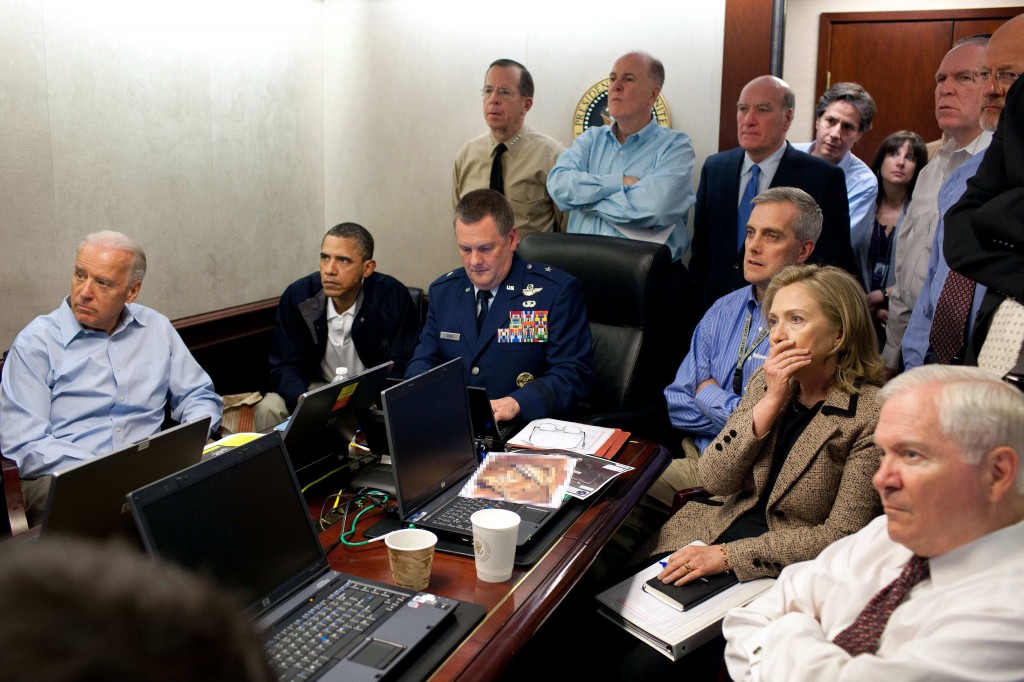The Bookworm Beat 6-24-15 — the “midnight ramblings” edition
 I should be heading for bed, as it’s after midnight, but I’m so thrilled to have a moment to myself that I can’t resist a little blogging. I’m feeling especially smug (and tired) tonight because my heroic 1:30 a.m. efforts yesterday were the difference between success and ignominious failure on a big motion. Damn it all! I deserve some time to write.
I should be heading for bed, as it’s after midnight, but I’m so thrilled to have a moment to myself that I can’t resist a little blogging. I’m feeling especially smug (and tired) tonight because my heroic 1:30 a.m. efforts yesterday were the difference between success and ignominious failure on a big motion. Damn it all! I deserve some time to write.
Anything you can be I can be better….
My favorite military humorist, Lee Ho Fuk has taken the Rachel Dolezal mantra — “anything you can be I can be better” — to a whole new level:
A Lance Corporal with Headquarters Regiment, 2nd Marine Logistics Group, who is accused of drunken and reckless driving after she allegedly clipped two Provost Marshal Office vehicles while passing through the main gate, claims she self identifies as a sober driver with a clean record, Duffel Blog has learned.
On Monday, Irene Hays, 27, was being read her rights under Article 31 of the UCMJ when she announced that she culturally identified as someone who drank responsibly and was otherwise completely sober throughout her weekend liberty, witnesses say.
Hay’s company First Sergeant was immediately rushed to Naval Hospital Camp Lejeune to treat a brain aneurism. He is reported to be in stable condition despite Hays’ assertion that she identifies as a teetotaler.
“Actually, I don’t like the term teetotaler; I prefer sober,” said LCpl Hays. “So, if asked, I would say, I consider myself as not driving under the influence of alcohol.”
Read the rest here.
Every American voter should be required to read this
Thomas Sowell isn’t shy about spelling out precisely what’s wrong with Hillary (that would be everything — everything is wrong with Hillary). What’s even more depressing than his indictment is his conclusion:
The fact that many people are still prepared to vote for Hillary Clinton to be president of the United States, in times made incredibly dangerous by the foreign-policy disasters on her watch as secretary of state, raises painful questions about this country.
A president of the United States — any president — has the lives of more than 300 million Americans in his or her hands, and the future of Western civilization. If the debacles and disasters of the Obama administration have still not demonstrated the irresponsibility of choosing a president on the basis of demographic characteristics, it is hard to imagine what could.
With our enemies around the world arming while we are disarming, such self-indulgent choices for president can leave our children and grandchildren a future that will be grim, if not catastrophic.
The best laid plans — medieval Japanese edition
I didn’t realize that the word “Kamikaze” predated World War II by almost 700 years. Go here to learn about that word’s origin, about the mortal threat to Japan’s existence in the 13th century, and about the fact that Japan was saved not once but twice by Black Swan events courtesy of Mother Nature (or the Gods).
Life is not fair — and in a free market that’s a good thing
I keep telling my kids life isn’t fair, and they keep insisting that I, as their mother, must wave some magical wand and either make it more fair for them (that is, put them in a better position vis-a-vis others) or make it less fair for everyone else (that is, put others in a less position than my children). I, being neither a socialist nor magical, refuse to help. Instead, I tell them to use their disappointments as learning experiences so that, next time things aren’t fair, they come out in the upper position. Ask questions, I say. I know appearing stupid is every teenager’s nightmare, but ask yourself which makes you look more stupid: Asking a question during an information gathering session or screwing up because you didn’t understand what was going on? I can’t fix these things. You can.
Why these words of motherly advice? Because of a good Dan Mitchell article about the benefits that flow from natural economic inequality, one that presupposes a neutral, fair economic system, without the government’s thumb on the scale. It’s good for the individual and it’s good for the economy. Most significantly, the fairest outcomes are those in which free market forces encourage all people to do what I’m telling my kids to do: optimize your own opportunities by learning from your failures and educating yourself about your goals and responsibilities.
A famous photograph — and a moving story
You’ve seen this picture, I’m sure:

Someone set out to discover the identity of the woman and child in the picture — and he succeeded, only to find more mysteries.
Speaking of Bergen Belsen, Queen Elizabeth will be going there. I have not been there (I’ve only been to Mauthusen), but a friend who has been there told me that it’s overwhelming to stand in front of one small square patch after another and to learn how many bodies are buried under each little patch.
The Germans were not the world’s most inhumane killers — there are too many vying for that title, including ISIS today, to hand out an award — but they were certainly the most efficient.
Obama is the worst President ever.
John Hinderaker, at Power Line, is a very dignified blogger. Before today, I’d never seen him engage in personal insults against Leftists, unless the insult was witty. Today, that changed, when he looked back at the 2012 presidential debate in which Romney warned about Russia and Obama had a snide retort. Pay particular attention to the last word in Hinderaker’s post (bolded emphasis mine):
Barack Obama to Mitt Romney, October 22, 2012, denying that Russia is a geopolitical threat:“The 1980s are now calling to ask for their foreign policy back, because the Cold War has been over for twenty years.”
Dumbass.
One of the reasons I try never to swear is because, when I do, it has impact. Hinderaker’s assessment of Obama’s mental abilities has impact.
What also has impact is Ralph Peters’ assessment of Obama’s performance in the war against ISIS. It is a performance distinguished entirely by Obama’s absence:
Faced with a foe prepared to do almost anything to impose its vision on the world, how great is our strength of will?
It’s all but non-existent. We have the greatest military in history, but dread using it. We deploy hyper-expensive aircraft and encourage lawyers to render them useless. Our president’s priority isn’t defeating the enemy, but avoiding civilian casualties. It’s an appallingly naïve vision of warfare and a fool’s denial of what it takes to win.
Obama speaking at a news conference during the conclusion of the G7 Summit in Germany. On his lack of an ISIS strategy Obama said, “When a finalized plan is presented to me by the Pentagon, then I will share it with the American people.”
In the name of humanitarianism, our president dreads accidentally killing civilians. So he condemns millions, both the willing and unwilling, to live under the Islamic State’s murderous tyranny.
Because our president will not accept hundreds of deaths, tens of thousands have died. And far more will die, including, in time, Americans.
Read the whole thing, but prepare to be saddened. I can’t help but think that, while I never thought at the time that Bush’s war in Iraq was such a terrible idea, especially after the Surge, to the extent it paved the way for Obama, who paved the way for ISIS, it was quite possibly, and inadvertently on Bush’s part, the most evil thing America has ever done.
And this is a good place to put Sen. Tom Cotton’s press release:
Senator Tom Cotton (R-Arkansas) today released the following statement in response to reports that the United States is sharing a military base with Iranian forces in Iraq:
“When I was a soldier fighting in Iraq, Iran supplied the most advanced, most lethal roadside bombs used against coalition forces. Many American soldiers lost their lives to Iran’s proxies and Iranian-supplied bombs. Further, Iran is the leading state sponsor of terrorism and has been attacking the United States for decades. It’s deeply troubling that the President now finds it acceptable to share a military base with this enemy, even while we are attempting to negotiate a deal to keep Iran from obtaining nuclear weapons.
“This report is a stark and nearly absurd demonstration of the Obama administration’s tacit accommodation of Iran’s strategic aim of extending its influence in Iraq. It echoes the president’s tacit accommodation of Iran’s wish to maintain Bashar al-Assad in Syria and his explicit accommodation of Iran’s nuclear ambitions.”
Dumbass. Amoral. Immoral. Evil. Awful. Bad. The only adjective I refuse to award Obama is “inept.” I think the path he’s treading today is one he wants to walk, not one he’s too dumb to avoid.
No, “Caitlyn” Jenner is not “normal”
It’s a free country. If Bruce Jenner feels comfortable using surgery and hormones in order to be the Jayne Mansfield of his generation, I say “Whatever.” I will not acknowledge, however, that what he’s doing is normal. It’s not. Normal for men is to be men. In a civilized country, we don’t persecute those who deviate from the norm, but the modern impulse to celebrate them is terribly destructive. Robert Tracinski thinks so too.
And I keep think of this, from Yeats, which seems to sum up our era with eerie prescience:
Turning and turning in the widening gyre
The falcon cannot hear the falconer;
Things fall apart; the centre cannot hold;
Mere anarchy is loosed upon the world,
The blood-dimmed tide is loosed, and everywhere
The ceremony of innocence is drowned.
The best lack all conviction, while the worst
Are full of passionate intensity.
Will the real Rick Perry please stand up?
My Texas friends, about half of whom are Lefties, hate Rick Perry with intensity, and insist that he’s even more stupid than they believe George W. Bush to be. The Leftist media piles on with the “Stupid Perry” rubric. But military veterans tell a different story, of a compassionate, intelligent man. Will the vets be heard over the media?
Guns save lives
Mr. Bookworm wanted me to watch an HBO propaganda piece about gun violence in America. I refused. Living in Marin and reading what my Leftist Facebook friends post means that, when it comes to stupidity about guns, I’ve pretty much reached the outer limits of my tolerance.
The ugly reality, the one no one dares speak, is that Americans don’t have a gun problem. Instead, African-Americans have a gun problem, since they account for most criminal shooters and most gun victims (dead or alive). Until we address that particular problem — heck, until we can even learn to speak about that heartbreaking, tragic, Democrat-owned problem — I don’t want to be on the receiving end of any HBO propaganda about guns.
And in any event, I prefer the numbers, which show that, as we all know, because America is blessed with more good people than bad people, when good people have guns, bad people find themselves at a disadvantage. (Oh, and yes, Obama is a dumbass.)
Day by Day Cartoon fundraiser
The brilliant Chris Muir is having his annual fundraiser so that he can continue to publish his Day By Day cartoon, which people can see for free. If you’re inclined to support a stalwart and witty voice for conservative thinking, drop by there and spend a few dollars.
And while I’m at it, one of my readers let me know that a relative of his is doing a fundraiser for suicide prevention. Having been through some bad times in my own life, I appreciate her willingness to tackle this issue. Again, if you’ve got a few dollars lying around (and doesn’t everyone in the seventh year of the Obama recession?), maybe you can send a little her way.
Admiral Swift was on to something
After this year’s annual Midway Commemoration Dinner, I wrote about the speech that Admiral Fleet, the new Commander of the U.S. Pacific Fleet gave. In relevant part, I said (and I’m going to quote at length here):
After having made this point about Nimitz’s willingness to trust his team, from the admirals on down, Admiral Swift said that our modern military today has a zero-tolerance attitude when it comes to mistakes. This attitude, while virtuous in its way (nobody wants the risk of a sloppily run, careless military), leads to micromanagement. Indeed, as a friend commented to me later, today’s communication advances mean that the people at the desks, from high-ranking military commanders to way too many lawyers, can oversee a battle in real-time, and provide running critique and commentary. Kind of like this:
My take on this is that, not only do too many cooks spoil the broth, there’s a problem when these cooks are focused on concerns other than winning a specific battle. Moreover, it can mean that important decisions get delayed while a message is being relayed down the line. For example, the same friend told me that D-Day might have turned out quite differently if Hitler hadn’t put himself in command. Although the commander of a Panzer division some 25 miles away from Normandy’s beaches could easily have moved in and destroyed the Americans, the Germans in Berlin who received the message about the D-Day landing were afraid to wake Hitler up. For that reason, there was a 12 hour delay before the Panzer commander was told to head for the beaches. By this time, though, the Americans were reinforced with men, vehicles, and weapons, and the German commander realized that he had lost his window of opportunity, and elected to regroup further inland.
Back to Admiral Swift’s speech, the Admiral said that, with excessive caution, micromanagement, and overly strong command-and-control (my words, not his), we run the risk of stifling the initiative, instinct, and moral courage that made possible victories such as Midway, victories that relied on experience, instinct, and a deep and abiding trust in ones team, starting with the admirals and captains, and running all the way down to the enlisted sailors. (Again, those are my words, not Admiral Swift’s, but I think that’s what he said.)
If I understand correctly what Admiral Swift was saying, this was a very important statement coming from the Commander of the Pacific Fleet, because it appears that he’ll use his position to give the people in his command more autonomy. Again, if I got this right, I highly approve of the idea. (If I got this wrong, someone correct me, please!!!)
Admiral Swift is not the only one thinking this way. In a Hoover Institute article about the continued relevance of Carrier Groups, Fighters, and Infantry divisions, Bing West, after reviewing our military’s strengths (money and the willingness to innovate) and weaknesses (budget cuts, entitlements, and a political refusal to focus on real dangers), gets to what he sees as the real problem our military faces, and it sounds remarkably like Admiral Swift’s assessment:
Concerning command during combat operations, the military claims it operates under mission-type orders; that is, the senior commander says my intent is to do so-and-so, and leaves execution to the junior commanders on the battlefield. In theory, the staffs at higher headquarters provide instantaneous information and firepower support to dispersed small units at sea, in the air or on the ground. The junior commanders of these small units then make the critical decisions at the point of the engagements.
Indeed, the U.S. military is keenly aware that many future battles must be conducted without electronic emissions; that is, forward-based units will receive data, but not expose their locations by communicating back to home base. This means allowing junior commanders to make strategic decisions, as Rear Admiral Raymond Spruance did at the decisive Battle of Midway seven decades ago. After mulling his decision for less than one minute, Spruance ordered every plane available in his task force—many with half-empty fuel tanks—to take off, search for and attack the Japanese fleet. One 40 year-old lieutenant commander ordered his squadron to continue across the red line beyond which there was not enough fuel to return.
That was 75 years ago. Would any rear admiral or squadron commander have that authority today? The answer is no. In practice, our military has been doing the opposite. Those at the very top—meaning the commander-in-chief and his trusted political staff in the White House—make the critical war-fighting decisions. Even rules of engagement are decided inside the White House, causing two successive Secretaries of Defense—Gates and Panetta—to voice their frustration.
It’s not just civilians who hoard decision-making authority. On September 11, 2012, as the battle at Benghazi raged intermittently for eight hours, the Chairman of the Joint Chiefs and the Unified Commander for Africa, both in Washington, retained authority yet issued no orders to assist those under attack. The concept of improvisation, of allowing subordinate commanders to take initiative, was not followed at the four-star level.
For decades, the military has trumpeted the emergence of the “strategic corporal,” meaning in theory a squad leader should be able to orchestrate astonishing firepower, while few American troops are placed at physical risk. In practice, the phrase has come to have a pejorative meaning, suggesting that the actions of junior troops—a sniper urinating on an enemy corpse or a single soldier deserting to the enemy—have debilitating and disproportionate political effects upon the overall war effort. Hence in practice, instant communications have resulted in senior commanders becoming too involved.
Precisely!

